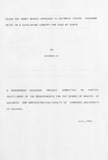| dc.contributor.author | Gichuki, P | |
| dc.date.accessioned | 2013-06-26T05:11:10Z | |
| dc.date.available | 2013-06-26T05:11:10Z | |
| dc.date.issued | 1991-07 | |
| dc.identifier.citation | Master of Business and Administration, University of Nairobi, 1991 | en |
| dc.identifier.uri | http://erepository.uonbi.ac.ke:8080/xmlui/handle/123456789/39997 | |
| dc.description.abstract | The study investigates the short term behaviour of
exchange rates in Kenya with the aim of making relatively
accurate short term forecasts using the asset market
approach to exchange rate modelling.
A sample of six different currencies is used to bring
out the relationship between the short term movement of
exchange rates and the nominal interest rates.
A regression of the current exchange rate against the
previous one and the differential interest rates reveals
that the time series of exchange rates is predominantly a
first order autoregressive process. The inclusion of
interest rates does not significantly improve the data
fitting performance of the model,though it appears to
improve the predictive performance.
To investigate this unexpected finding,the first order
difference in exchange rates is regressed against the the
interest differential. The result gives poor data fitting
and the F-test confirms that the regression is not
significant. A close examination of the time series of the
first order difference of exchange rates using the
autocorrelation function shows that it is very close to
white noise,thus suggesting that exchange rate movement in
Kenya have closely .followed a random walk process with a
drift. | en |
| dc.language.iso | en | en |
| dc.publisher | University of Nairobi. | en |
| dc.title | Using the asset market approach to estimate future exchange rates in a developing country:the case of Kenya | en |
| dc.type | Thesis | en |
| local.publisher | Faculty of Commerce | en |

